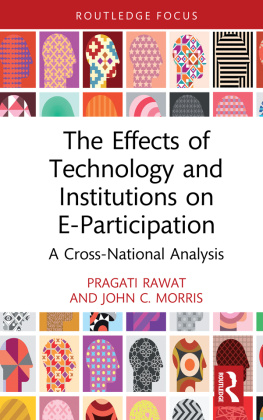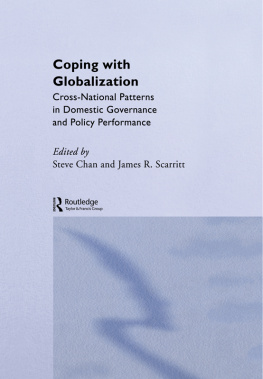The book focuses on an important promise of digital government, e-participation, which the authors rightly frame as the extension of public participation using ICTs. The book provides a much-needed emphasis on e-participation, with an international and comparative perspective on the factors enabling this phenomenon. The authors also offer important recommendations pertaining to regulations, skills, infrastructure, technological access and political mechanisms to foster an environment for enhanced e-participation.
Aroon Manoharan, University of Massachusetts Boston
The Effects of Technology and Institutions on E-Participation: A Cross-National Analysis provides a new approach to examine and understand the factors that promote or constrain e-participation and its potential to increase democracy across the global community. This research expands the existing e-participation literature by combining theories of the policy process and information technology to examine the efficacy of e-participation. The findings from the study can provide policymakers and public managers a better understanding of the factors that facilitate citizen participation through the utilization of information and communication technology.
Luisa Diaz-Kope, University of North Georgia
In a time when we are more connected than ever, for better, and worse; there is strikingly little consensus on how the public sector can best leverage technology toward a more democratic and participative society. Rawat and Morris ambitiously set out to address this cleavage by identifying factors that drive e-participation at a cross-national level. By emphasizing the role of institutions in driving e-participation, the authors provide a policy roadmap that will surely be of interest to policymakers and scholars interested in how to more effectively utilize technology to promote active and inclusive participation.
Martin Mayer, The University of North Carolina at Pembroke
This book offers an intriguing exploration of e-participation as a means for engaging public participation through the utilization of information and communication technology at a cross-country level. The unique framework developed by the authors incorporates policy feedback and socio-technical theories. Through the use of reputed international sources within a multivariate analysis, this model suggests factors related to political and regulatory environment combined with political rights and civil liberties can be brought together in different ways to foster e-participation across countries. This advancement of theory by Rawat and Morris will be of interest to scholars, students, and those interested in better understanding public participation mechanisms from an international perspective.
Madeleine Wright McNamara, Tulane University
Pragati Rawat and John C. Morris have provided readers with an excellent analysis of cross-national e-participation as a form of citizen engagement and as a public policy tool. The book is highly informative, relevant, well written, and eminently engaging. The findings and insights are particularly especially useful given ongoing policy challenges related diversity, equity, and inclusion, declining trust, sustainability, as well as the COVID-19 pandemic. In short, the book is an original contribution to the e-governance scholarship with important lessons for the future of citizen engagement.
Jonathan M. Fisk, Auburn University
The Effects of Technology and Institutions on E-Participation
In this book, Pragati Rawat and John C. Morris identify and evaluate the impact of factors that can help explain the difference in e-participation, public participation using information and communication technology, in different countries.
While cross-sectional studies have been covered, few have taken an in-depth look at cross-national studies. This book attempts to fill the gap using quantitative panel data to explore the influence of technology and institutions, and the impact of their complex relationships in a mediation and moderation analysis, on e-participation. The current study reviews the scholarly work in the field of offline and online participation to identify a set of antecedents that influence e-participation. A conceptual framework is developed, supported by the theories from the public policy and socio-technical premise. The authors utilize secondary data, primarily from the United Nations (UN) and World Economic Forum, for 143 countries from three waves of surveys to measure the dependent and explanatory variables. The panel data are statistically analyzed and findings reveal the role of technology as a mediator as well as a moderator for institutions impact on e-participation.
The Effects of Technology and Institutions on E-Participation provides a groundbreaking country-level analysis that will appeal to academics and students of e-government and Digital Government, Public Policy, Public Administration, Public Sector Innovation, and Public Participation.
Pragati Rawat holds a PhD in Public Policy from Old Dominion University. An engineer and MBA from India, she has about 20 years of work experience in multinationals and government. Prior to joining the PhD program, she was engaged as a Process Manager in the Unique Identification program of the Government of India that created worlds largest biometric database of residents for effective service delivery and inclusion. She has published articles in journals such as in Politics & Policy, Journal of Environmental Studies and Sciences, Marine Technology Society Journal, and Public Works Management & Policy.
John C. Morris is a Professor in the Department of Political Science at Auburn University. Prior to his appointment at Auburn, he held a joint appointment as a Professor of Political Science in the Department of Political Science and Geography, and a professor of public administration in the School of Public Service at Old Dominion University. He has published widely in public administration and public policy. He is the co-editor of Speaking Green with a Southern Accent: Environmental Management and Innovation in the South (2010), and True Green: Executive Effectiveness in the US Environmental Protection Agency (2012). He is also the co-editor of Building the Local Economy: Cases in Economic Development, published by the Carl Vinson Institute of Government, University of Georgia, in 2008; is the co-editor of a three-volume series (2012) on prison privatization, titled Prison Privatization: The Many Facets of a Controversial Industry; and Advancing Collaboration Theory: Models, Typologies, and Evidence (Routledge, 2016). His most recent books include The Case for Grassroots Collaboration: Social Capital and Ecosystem Restoration at the Local Level (2013, with William Gibson, William Leavitt, and Shana Jones); State Politics and the Affordable Care Act: Choices and Decisions, co-authored with Martin Mayer, Robert Kenter, and Luisa Lucero (Routledge, 2019); Organizational Motivation for Collaboration: Theory and Evidence, co-authored with Luisa Diaz-Kope (2019); Better Together: Multiorganizational Arrangements for Watershed Protection, co-authored with Madeleine W. McNamara (2021, Routledge); and Policy Making and Southern Distinctiveness, coauthored with Martin K. Mayer, Robert C. Kenter, and R. Bruce Anderson (2022; Routledge). His most recent book is Clean Water Policy and State Choice: Promise and Performance in the Water Quality Act (2022). In addition, he has published more than 70 articles in refereed journals, and nearly 40 book chapters, reports, and other publications.













